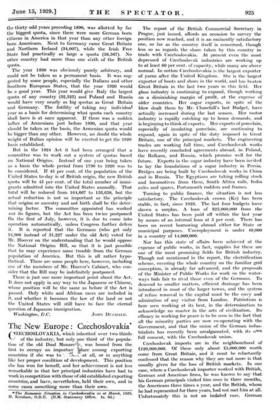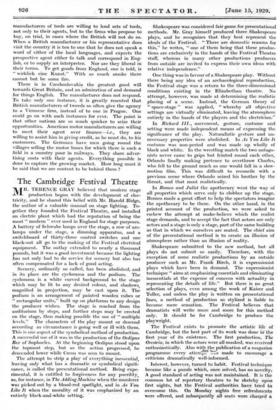The New Europe: Czechoslovakia*
CZECHOSLOVAKIA, which inherited over two thirds of the industry, but only one third of the popula- tion of the old Dual Monareir, was bound from the first to occupy an importart 'lace among exporting countries if she was to at all, or in anything like her proper condition of development. This position she has won for herself, and her achievement is not less remarkable in that her principal industries have had to work in competition with those of old established exporting countries, and have, nevertheless, held their own, and in some cases something more than their own.
* The Economic Situation in Czechoslovakia as at March, 1929. IL Kershaw, O.B.E. (ELM. Stationery Office. Is. 6d.) . The report of the British Commercial Secretary in Prague, just issued, affords an occasion to survey the position now reached, and it is an eminently satisfactory one, so far as the country itself is concerned, though less so as regards the share taken by this country in trade with Czechoslovakia. At present even the most depressed of Czechoslovak industries are working up to at least 60 per cent. of capacity, while many are above normal. In cotton Czechoslovakia is the largest exporter of yarns after the United Kingdom. She is the largest exporter of boots and shoes in the world, and has beaten Great Britain in the last two years in this field. Her glass industry is continuing to expand, though working LW a diminishing margin of profit, at the expense of older countries. Her sugar exports, in spite of the blow dealt them by Mr. Churchill's last Budget, have actually increased during the last season. Her motor industry is rapidly catching up to home demands, and is beginning to think of exports. Her exports of porcelain, especially of insulating porcelain, are continuing to expand, again in spite of the duty imposed in Great Britain, one of the principal markets. The engineering trades are working full time, and Czechoslovak works have recently concluded agreements abroad, in. Poland, the Balkans, and Russia, which promise well for the future. Experts in the sugar industry have been invited to lay the foundations of a sugar industry in Persia. Bridges are being built by Czechoslovak works in China and in Russia. The Egyptians are taking rolling stock and locomotives from them, South Africa rails, India axles and spares, Portsmouth rudders and frames.
Turning to public finance, the situation is not less satisfactory. The Czechoslovak crown (Kc) has been stable, in fact, since 1923. The last four budgets have shown a surplus. A loan of $25,000,000 from the United States has been paid off within the last year by means of an internal loan at 5 per cent. There has been no recent borrowing abroad either for State or municipal purposes. Unemployment is under 40,000 in a country of 14,000,000.
Nor has this state of affairs been achieved at the expense of public works, in fact, supplies for these are one of the most promising fields for British industry. Though not mentioned in the report, the electrification scheme, covering the whole country on the familiar grid conception, is already far advanced, and the proposals of the Minister of Public Works for work on the water- ways bids fair to rival those even of the Germans. To descend to smaller matters, efficient drainage has been introduced in most of the larger towns, and the system of refuse removal in the capital must be the envy and admiration of any visitor from London. Patriotism is here seen working at its best, in the determination to acknowledge no master in the arts of civilization. Its efficacy in working for peace is to be seen in the fact that all the minority parties are now co-operating with the Government, and that the union of the German indus- trialists has recently been amalgamated, with its own full consent, with the Czechoslovak union.
Czechoslovak imports are in the neighbourhood of £120,000,000. Of these only about £5,000,000 worth come from Great Britain, and it must be reluctantly confessed that the reason why they are not more is that usually given for the loss of British markets. In one case, where a Czechoslovak importer worked with British, German and American firms, he was known to say that his German principals visited him once in three months, the Americans three times a year, and the British, whom he had represented for three years, had not met him at all. Unfortunately this is not an isolated case. German manufacturers of tools are willing to lend sets of tools, not only to their agents, but to the firms who propose to buy, on trial, in cases where the British will not do so. When a British manufacturer or his representative does visit the country it is ten to one that he does not speak a word of either of the local languages, and expects the prospective agent either to talk and correspond in Eng- lish, or- to supply an interpreter. Nor are they liberal in their terms. To get goods from England, one is told, is " wirklich eine Kunst." With so much smoke there cannot but be some fire. There is in Czechoslovakia the greatest good will towards Great Britain, and an adniiration of and demand for things English: The manufacturer does not respond. To take only one instance, it is greatly resented that British manufacturers of tweeds so often give the agency to a Viennese firm, instead of to one in Prague. One could go on with such instances for ever. The point is that other nations are so much quicker to seize their opportunities. American motor manufacturers are willing to meet their agent over finance—i.e., they are willing to assist him in giving credit, as he must do, to his customers. The Germans have men going round the villages selling the motor buses for which there is such a field in a country poor in railways. They share adver- tising costs with their agents. Everything possible is done to capture the growing market. How long must it be said that we are content to be behind them ?







































 Previous page
Previous page